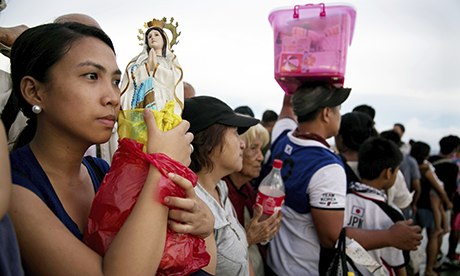You can't make it up XXXXI - Philippines typhoon deaths blamed on - guess what? (09 nov 13)

Thousands of Philippinas are dying in a massive typhoon, and the hacks blame it on climate change:
http://www.theguardian.com/commentisfree/2013/nov/08/typhoon-haiyan-rich-ignore-climate-change
By attributing the deaths to "climate change", the media are effectively saying nothing can be done. Even if they could emotionally blackmail the inhabitants of rich countries to halve their oil consumption, even the IPCC's models predict virtually no effect on the alleged menace of anthropogenic warming.
What they could say is that people who live in countries menaced by typhoons, tsunamis, sea level rise etc. need to organize, and rid themselves of corrupt governments incapable of organizing, housing and emergency services capable of reducing the death toll from natural disasters.
An earthquake in China would kill dozens of times more people than the same earthquake in San Francisco. That's because Califormia has the wealth, culture and organization to reinforce buildings, bridges and roads to make them more earthquake-proof. It's the same with weather. Even hurricane Katrina, which struck the most corrupt part of the USA in 2005, and whose hurricane defences were organized by a branch of the Pentagon, killed fewer people than the Galveston hurricane of 1900 or the Okeechobee hurricane of 1928. That's because living conditions have improved. It's nothing to do with global warming.
An example of some of the attitudes which hinder the development of comparable conditions in the Philippines can be seen in the picture. The more you believe praying to the Virgin Mary can help save people from disasters, the less you believe in the need for better material conditions. The maximum benefit is 100%. If praying can take you half way there, you are half as inclined to fix the material issues as someone who believes praying has no effect at all.
After writing the above post, I came across this, by Bjørn Lomborg, which basically concurs with what I said above, and backs it up with science:
https://www.facebook.com/bjornlomborg
It is phenomenal. Climate campaigners like John Vidal in Guardian keeps arguing that the terrible typhoon Haiyan shows we need to do more about global warming.
Yet, even *after* Haiyan, the Accumulated Cyclone Energy of all cyclones in the Western North Pacific is below normal - (99%,
http://models.weatherbell.com/tropical.php). The global ACE is at 74%.
As you can see in the graph below, both Northern Hemisphere ACE and global ACE are at the lowest since the 1970s.
Yes, there are ferocious cyclones in the world, as they always have been. But first, you can't argue that global warming is making them worse, when the indicators are *lower*.
Second, claiming that CO₂ cuts is the way to tackle cyclone damages is simply immoral. Even if we cut emissions dramatically, it will have only little impact in 50-100 years. If you want to help places like Tacloban and the Philippines, it is all about adaptation.
Again, it is likely that global warming will make cyclones somewhat stronger, though likely also somewhat fewer. In total, cyclones cost 0.04% of global GDP now. Since a richer world will also be a world with better protection (Florida is much less vulnerable to cyclones than Guatemala), by the end of the century, cyclones will cost 0.01% of global GDP. And because of increasing damages from global warming, the total cost will probably go to 0.02% of global GDP. (http://www.nature.com/nclimate/journal/v2/n3/full/nclimate1357.html)
But overall cyclones will destroy *less*. We will see a reduction from 0.04% to 0.02% of GDP.
And finally, remember, that we cannot see the global warming fingerprint in cyclones today or anytime soon. GFDL from NOAA estimate that an "increase may not be detectable until the latter half of the century" (http://www.gfdl.noaa.gov/global-warming-and-hurricanes)
Vidal in Guardian:
http://www.theguardian.com/commentisfree/2013/nov/08/typhoon-haiyan-rich-ignore-climate-change
Graph of ACE:
http://models.weatherbell.com/tropical.php